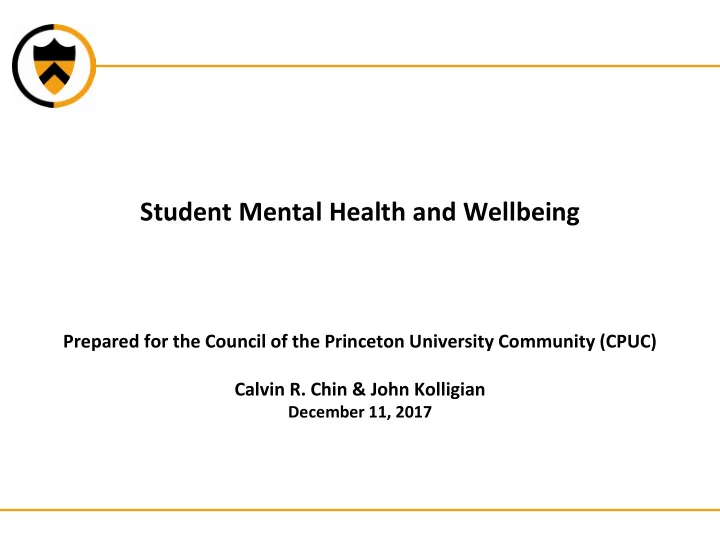

Student Mental Health and Wellbeing Prepared for the Council of the Princeton University Community (CPUC) Calvin R. Chin & John Kolligian December 11, 2017
Which health issue do students report as having the greatest adverse academic impact? A. Colds/Flu B. Stress C. Sleep issues D. Stomach problems E. Alcohol use
Campus-wide Surveys: Top 5 Health Issues Impacting Princeton Students’ Academic Performance (2010-16*) 2010 2011 2012 2013 2014 2016 1 Stress Stress Stress Stress Stress Stress 2 Sleep difficulties Sleep difficulties Anxiety Sleep difficulties Anxiety Sleep difficulties 3 Anxiety Anxiety Sleep difficulties Cold/Flu/Sore Sleep difficulties Anxiety Throat 4 Cold/Flu/Sore Cold/Flu/Sore Cold/Flu/Sore Anxiety Cold/Flu/Sore Cold/Flu/Sore Throat Throat Throat Throat Throat 5 Depression Depression Depression Depression Depression Depression Stress = most commonly experienced health concern, & reportedly has largest academic impact – Consistent with national benchmarks – Academic workload, concerns about future, balancing multiple commitments, & relationships [*Based on 5,424 Observations; National College Health Assessment]
By what percentage has the number of Counseling & Psychological Services (CPS) visits increased since academic year 2001? A. 5% B. 15% C. 50% D. 70% E. 115%
Utilization of CPS Services Since AY 2001 Total CPS Visits 10,679 11,000 10,000 9,000 8,181 8,000 Number of Visits 6,668 7,000 6,000 4,954 5,000 4,000 3,000 2,000 1,000 Academic Year
Framework for Supporting Mental Health and Wellbeing
What percentage of the student body did CPS see last year? A. 3% B. 5% C. 15% D. 22% E. 41%
Counseling & Psychological Services-Utilization in AY2017 % Utilization 22% 22% 25% 21% 20% CPS serves 22% of the student body 20% 15% Princeton’s utilization is comparable 15% 10% to Ivy peers 10% Recent utilization is more than 5% double the national average 0% Princeton Ivy 1 Ivy 2 Ivy 3 Ivy 4 National
Our Strategy: Increase Help-Seeking Behavior STUDENTS Partner with us in destigmatizing mental health treatment Acknowledge vulnerability and encourage your peers to reach out for help when they need it Consider that 40% of students have CPS contact at some point FACULTY/STAFF Normalize struggles—everyone needs support at times and getting help is also a sign of strength Be informed and have information accessible about CPS and other people/resources that comprise our student safety net RESOURCES Princeton Distress Awareness & Response; UMatter website; Request CPS/UHS in-service “gate keeper” trainings in this area
What percentage of Princeton students say that they have a responsibility to intervene for someone in mental or emotional distress? A. 15% B. 34% C. 49% D. 73% E. 91%
Our Strategy: Identify Students at Risk STUDENTS Get informed about signs of distress Be a proactive bystander – reach out Speak with your RCA or DSL about notable changes in behaviors FACULTY/STAFF For undergraduates: when concerned about a student, alert Deans/DSL’s/Residential College staff; call CPS For graduate students: when concerned, alert the Deans/Department Administrators/DGS; call CPS Host a Princeton Distress Awareness & Response (PDAR) training in your department RESOURCES Contact CPS for a consult; Kognito At-Risk for Students; Guide-- Recognizing and Responding to Students in Distress
What is the average “wait time” for an initial appointment at CPS this semester? A. 1 day B. 6 days C. 12 days D. 17 days E. 22 days
Access to care: “Wait time” Wait Time - Initial Appointments 09/01/17 - 11/27/17 160 120% 144 140 95% 97% 98% 99% 100% 100% 100% 100% 100% 100% 140 100% 90% Percentage of Students 84% 120 80% 71% 100 Frequency 84 80 80 60% 65 47% 60 34% 40% 37 40 23% 27 20% 15 20 6 4 4 2 1 0 0 0 0 0% 1-2 3-4 5-6 7-8 9-10 11-12 13-14 15-16 17-18 19-20 21-22 23-24 25-26 27-28 29-30 >30 Wait Time (in Days) Frequency Cumulative Contribution
Our Strategy: Provide Mental Health and Substance Abuse Services DESIGNED A NEW CLINICAL TREATMENT COORDINATOR POSITION Foster student connections within our service as well as with local providers Assist students transitioning to community care, and monitor care of students as needed CREATED AN EXCLUSIVE PROVIDER NETWORK New network of local mental health clinicians who see Princeton students at reduced fees Broadened referral network, improving access to affordable, quality mental health care EXPANDED OUTREACH PROGRAMMING Seek to destigmatize the use of mental health services, and increase help-seeking behaviors and access to services
Future Directions Access: Explore satellite offices for CPS at different sites on campus to further extend service reach Services: Develop convenient online options for mental health care (“telemental health”) —as a supplement to in-person therapy or as a stand-alone treatment Outreach: Expand mindfulness outreach programs and other trainings to promote well-being and resilience in the face of stress and challenges Diversity: Identify promising therapeutic interventions that are effective in meeting the needs of our changing student population and those students who do not access traditional services Education: Advance community-based prevention programs
Questions, Comments, Discussion Contacts: Calvin Chin: 609-258-6638 & cc23@Princeton.edu John Kolligian: 609-258-9130 & jkjr@Princeton.edu
17
What do students say about stress? (2016) How would you rate the overall level of stress you have experienced (last 12 months)? • A higher percentage of Princeton More than average stress Tremendous stress students report “more than average 59.1% 56.5% 54.7% stress” than the NCHA reference group. 11.7 9.9 • There is no difference between the 11.4 percentage of Princeton students reporting “tremendous stress” vs. the NCHA reference group. 47.4 46.6 • Princeton students feel the most stress 43.3 about academics Princeton NCHA UG Princeton Undergraduate Reference Group Graduate 19
Recommend
More recommend